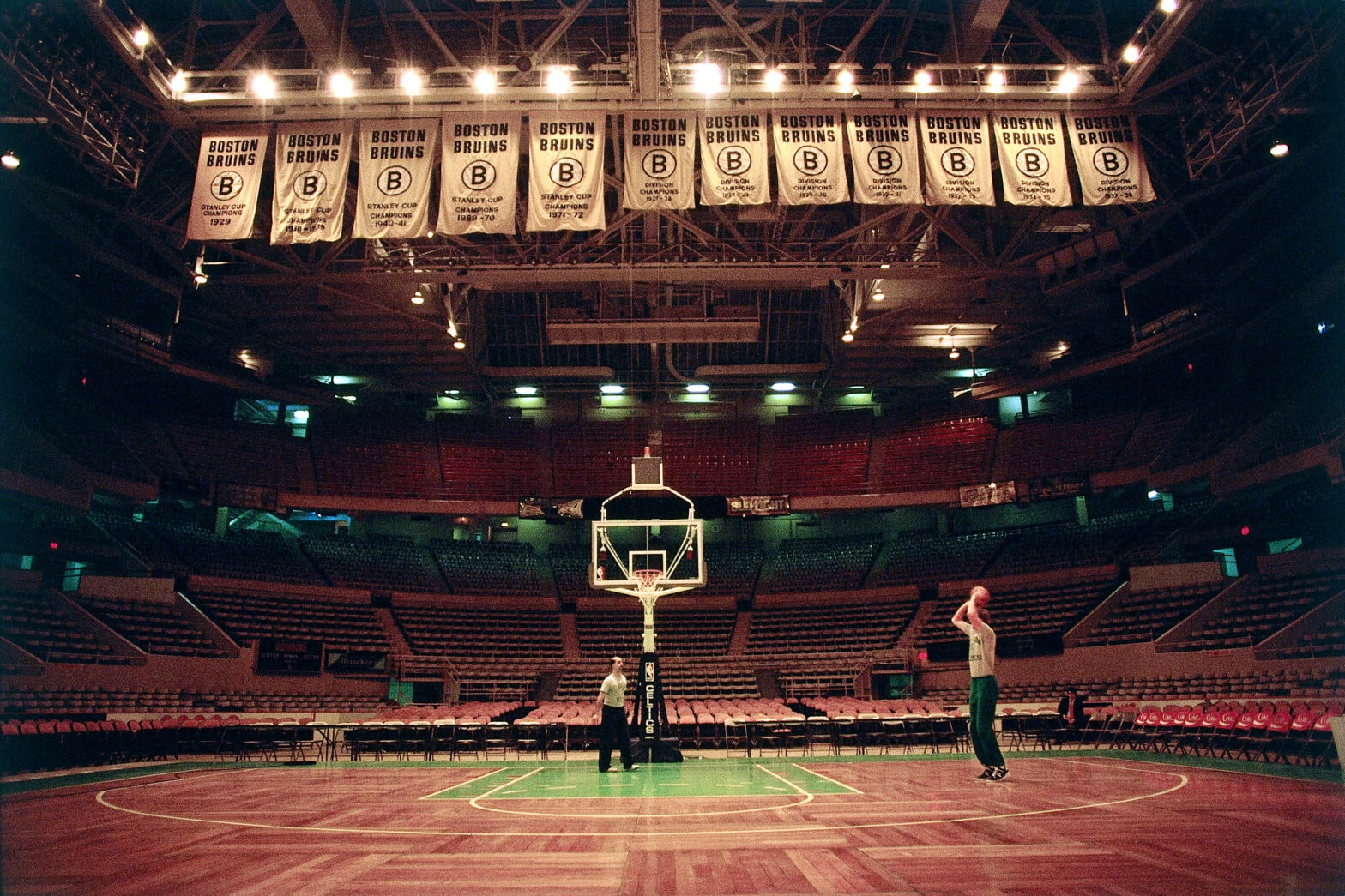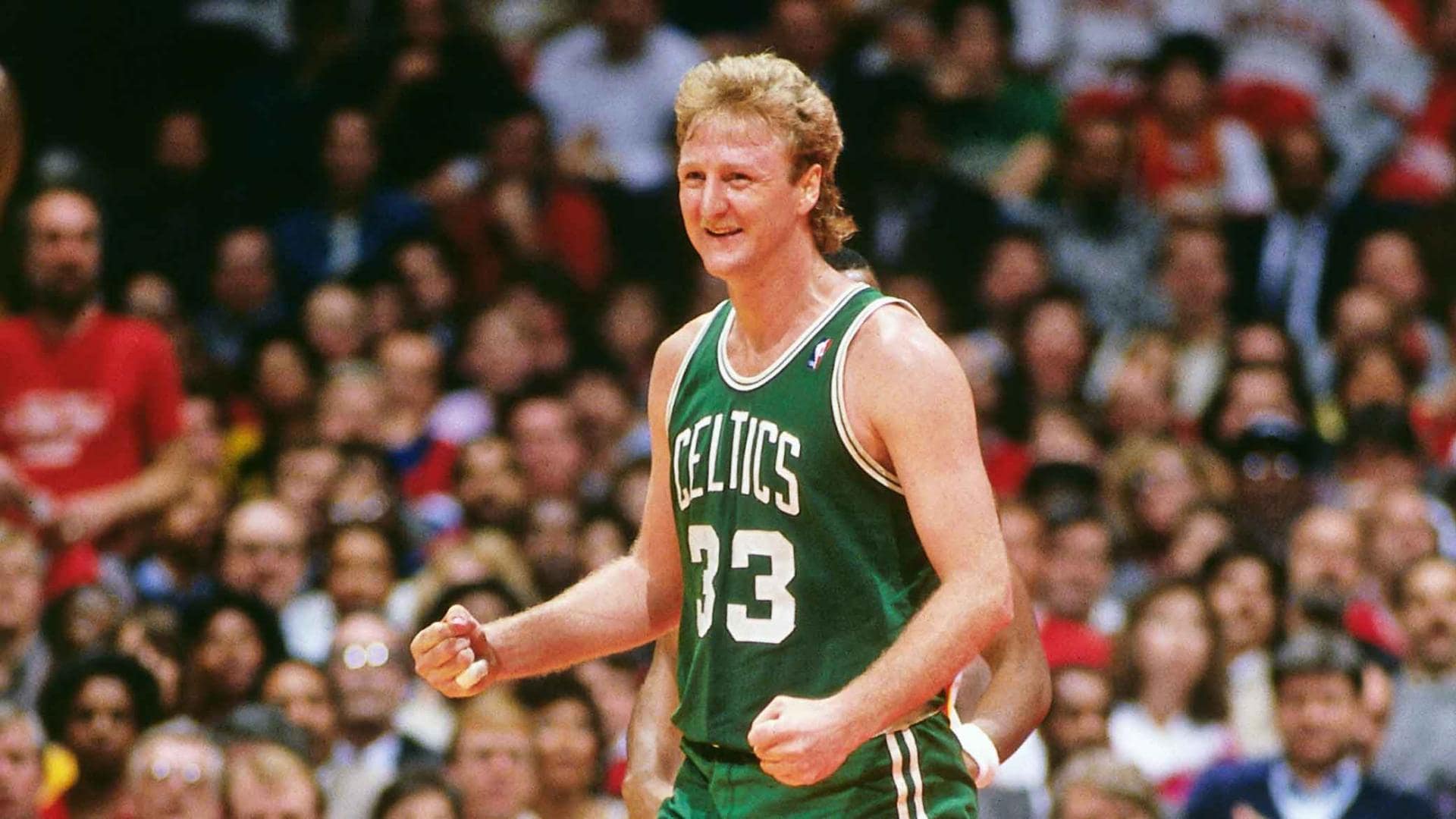This is the thing that is most difficult to work out about the way Larry Bird played basketball: He often made the simple play, the play that, if you watched Bird enough, he had educated you to believe was the most pragmatic. Yet in performing a routine act, he somehow made it spectacular, somehow made it memorable, somehow made it different. His execution was such that it never felt like forced flash, but rather, part of this grand plan to deliver the winning play. Lots of players could ball-fake, but how many made their defender completely turn away in the process? Lots of players made nice passes, but how many made the split-second decision to, when faced with a defensive wall, whip the ball through the opponent’s legs to a free teammate? And lots of players have come through in the clutch, but why launch from afar off two feet when you can do so off one?
Follow basketball closely enough and by now you will have heard this about a great player: ‘He makes his teammates better.’ For Bird, that wasn’t enough. He made his opponents play harder, his fans smarter, the league greater. Lots was made of what Bird wasn’t — couldn’t run, couldn’t jump, supposedly not athletic — so how about this for an alternate legacy to the game: He made those qualities less important. He didn’t render them useless, but he accentuated other elements — confidence, intellect, coming through when your team needs you most — and helped broaden the scope of what a great basketball player could possibly be comprised of.
I can’t describe what you’re about to see. Just watch.

For Bird, in winning Rookie of the Year in 1980 and helping the Celtics to a 32-game improvement, it was already too late: Basketball had changed forever, especially in Boston. And to think it started so innocuously.
He was drafted in 1978 while still at Indiana State and, by his own choosing, not yet available.
His first rookie camp was at Camp Milbrook in Marshfield, Mass., outdoors with wooden backboards. And his first exhibition game was in a practically empty Madison Square Garden against the Sixers. And that, it seems, was the last time he was off the grid. For when the 1980s commenced, Bird’s standing in basketball was quickly established: The greatest all-around forward to ever wipe the bottom of his sneakers.
Here, we trek back to the beginning. To training camp, to before a jumper was hit in anyone’s face or a word of trash was uttered.
Here is Bird, after his FIRST DAY as a Celtic on Sept. 11, 1979, talking expectations for his first season.


The 1983-84 season was about redemption for Bird and the Celtics. Boston had been swept in the Eastern Conference semifinals by Milwaukee in 1983 and Bird, as he did every offseason, retreated to his outpost paradise (French Lick, Ind.) to fine tune the masterpiece. What resulted beginning in 1984 was a seven-game triumph over the Lakers and the first of three consecutive Most Valuable Player awards (he remains the only non-center, the only in the non-Russell-or-Chamberlain division, to have done so).
But we aren’t going to game action here to look at that first MVP. We are going to listen to words, the words of Red Auerbach. It was Auerbach, you see, who had taken something of a flyer on Bird, selecting him as a junior eligible, then betting on himself to get Bird signed before the next draft and thus not lose his rights. Beyond that, he saw in Bird an encapsulation of all he had built since taking residence in Beantown in 1950; a player who had a touch of this, a touch of that, from each of the franchise’s greats who had not only come before, but who had placed sacred flags into the rafters of Boston Garden.
We are taking a look at the NBA Awards Banquet from 1984 with Bird being awarded his first MVP. Note: If Auerbach says it’s an honor for him to present you something, then what other loftier goals could one possibly have?

A quick diversion to the lab for a moment of ornithology (Google will tell you the same thing I will – it’s the study of birds, or in this case, the study of Bird). Passing from the forward position was not an unseen occurrence when Bird arrived. Maurice Stokes had been prolific as a distributor, as had Elgin Baylor and Rick Barry, among a few others. But as you’re about to see, what separated Bird from forwards, guards and any civilized human, in fact, was that he could turn most situations into an assist. Inbounding after the opposition had scored (throwing the baseball pass the length of the floor), an offensive rebound (tipping it to advantage before anyone else could grab it), even doubled in the post (where the only free man was standing under the basket with Bird’s back completely to him). In everything he did he seemingly picked the most inopportune time for his opponent to strike, especially when passing.

Bird’s assets here were uncanny reflexes, vice-like hands and wrists (has anyone ever had thicker wrists?), all-court vision, and, perhaps understatedly so, an almighty imagination. Here, the ultimate ode to Bird the passer.
Here’s a cool ‘did you know?’ on Bird’s storied playoff career: His two highest scoring postseason games came in the same series, just eight days apart. Indeed, of all the wonderful moments conjured over 164 playoff games, Bird’s two best point totals — 43 and 42 — came in the 1985 conference semis against the Pistons. This was Bird slap-bang in the middle of a glorious prime and we get the whole show here: Turnarounds out of the post, lefty scoops, runners in the lane – if Bird could think of it, he could do it. And in 1985, nothing was out of his repertoire.
As good as Bird was during those two games in the 1985 playoffs, in his own personal memory-making portfolio they and just about everything else pale in comparison to what he did in New Orleans on March 12, 1985. Playing the Hawks on a neutral site, Bird treated onlookers to a shooting exhibition of the out-of-this-world variety (as you will see below). But a quick backstory: Just nine days earlier, Kevin McHale had broken the team record for points with 56, and Bird had chided him for not chasing 60. Why? Could it be that, Bird, himself, had made that very same mistake? The month prior, he opted to sit out the fourth quarter of a game at Utah where he needed one steal for a quadruple-double. Or consider March 30, 1983, when he entered the fourth with 48 points, played a short stint in that final period, reached 53, then sat the final five minutes and let an all-time performance go begging. Could it be that Bird had to right these wrongs, instead of McHale’s?
Back to March 1985, and to Lakefront Arena in New Orleans: Bird scored an incredible 18 points over the final 5:11, making shots strictly of the you-name-it-and-he-did-it category. Teammates were embracing, opponents — opponents? — were celebrating, and Bird, for the only time in his career, hit the 60-point mark.


Bird’s rivalry with Magic Johnson was so profound and so unusual that at some point they metamorphosised from fierce rivals into teammates on their own private group. It of course started on a Monday night in Salt Lake City in 1979, a national title game that attracted a record number of eyeballs, and theatrically culminated in a series of Finals duels in the 1980s. You know the history: A decade belonged to them; a style of play belonged to them. In fact if scientists were to construct a DNA model of Bird and Johnson in pure basketball terms, accounting for ideology on how the game was meant to be played, for on-court vision, for clutch ability, for appetite for winning … it’s entirely possible they would be identical.
You may be wondering, what is there to be learned about Bird and Magic that isn’t already known, hasn’t been used in a documentary, or written about in a book? Try this: Between April 5, 1978, when the pair first teamed up for the World Invitational Tournament in Atlanta as members of a USA Select team, and Aug. 8, 1992, when they both earned gold medals at the Barcelona Games as part of the Dream Team — Bird and Magic shared an arena for basketball on 72 occasions. This includes exhibitions, charity games, Finals games — any form of organized basketball, you name it.
And for all the surface-level contradictions that Bird vs. Magic seemingly represented in the beginning, it wasn’t until the end that we realized the reason this was all so special: They were in fact one and the same.

The 1985-86 Celtics are, and will continue to remain, one of history’s greatest teams. Beyond their near-flawless record at home (a singular loss on the parquet was the resume’s only blemish) and a destructive run through the playoffs that ended in championship No. 16, it was how that team played as a unit that resonates best beyond the tangible facts. These Celtics shared the ball, were abundantly confident, went out of their way to destroy allcomers, and were intensely focused on winning. The perfect team shaped in the image of its leader.
There are two ways to view Bird’s steal against the Pistons in Game 5 of the 1987 Eastern Conference Finals. Perhaps you have seen the highlight too many times, perhaps you’re immune. You see it, understand its greatness, then move on. Alternatively, you could go deep. Boston trailed in that instant, didn’t have the ball, and were facing a series deficit with a loss and heading back to Detroit, with elimination waiting. When Bird lay on the floor after having his shot blocked, the Pistons scrambling to get the ball inbounds, shock setting in at the Garden, what reason did he have to get up? The Celtics’ stubborn title defense, one thwarted by an endless assortment of injuries and just plain bad luck, finally looked shot.
If a player has ever been better defined by his actions in one fleeting moment, then we haven’t seen it. It was pure Bird. The anticipation, the reaction, the improbability of it all. To steal the ball and not be so overzealous that you don’t bat it out of bounds; to secure the ball, walk the tightrope, and turn for salvation; to flick a pass to a cutting teammate (it could only have been Dennis Johnson) in position to score. Ask yourself: How many immortal plays are made by someone standing deep on the baseline, effectively behind the backboard, with their back to the basket?
Go ahead, watch it here (including a balcony view that makes it feel like you’re there) as Bird breaks it down with incredible detail.

One school of thought as to why Larry Bird was so beloved was that he represented some type of everyman who doubled as one of the greatest players ever. But let’s be honest, he was no everyman. Rather, he has gone without duplication. Bird played the game with unshakeable confidence in everything he did, was seemingly capable of making any shot or completing any improbable pass. He could perform miracles in an instant. So perhaps this is a more valid theory, and perhaps the greatest compliment when examining the totality of Larry Bird: He played basketball exactly how we would all like to play it.











